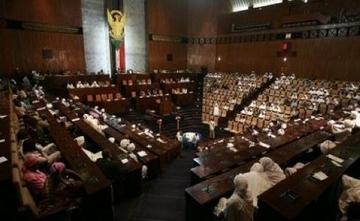Sudan’s parliament backs Bashir’s decision to halt oil flow
June 10, 2013 (KHARTOUM) – Sudan’s National Assembly has expressed support to president Omer Hassan al-Bashir’s decision to halt oil flow from South Sudan with only one MP dissenting.

Bashir had warned last month that he would block the oil flow if Juba continues providing assistance to insurgents fighting in South Kordofan and Blue Nile states or in the Darfur region. Juba routinely denies the allegations.
The head of the parliamentary subcommittee for economic affairs Omar Ali Al-Amin, said that the president’s decision was “absolutely right” and pointed out that the cooperation agreements is one package and that security arrangements are an integral part of the economic matrix, saying “economy fails in the absence of security”.
In September of last year, both Sudan and South Sudan signed a series of cooperation agreements, which covered oil, citizenship rights, security issues, banking, border trade among others.
However only last March, the two countries signed an implementation matrix for these deals which was hailed as a major breakthrough in the mostly tense relations between the two ex-foes.
Al-Amin stressed that Sudan’s budget will not be affected by the decision to halt exporting the southern oil and pointed that tax and custom revenues in the first quarter of the current fiscal year yielded 92% with performance ratio of 116% , stressing that the budget is running well without oil revenue.
The MP further disclosed that they are working with the finance ministry on package of economic measures to reduce the deficit in the balance of payments through substituting imports and engaging in partnerships with the private sector in the sugar industry as well as subsidizing the US dollar for exports.
But the prominent MP from the ruling National Congress Party (NCP) Ghazi Salah Al-Deen al-Atabani, said in statements at the parliament that Bashir’s decision could have been much stronger and far-reaching if it was made through state’s institutions such as the parliament or the cabinet.
Al-Atabani has been critical of the government and the NCP in recent months which many observers believe was the reason behind removing him as the head of the party’s parliamentary bloc.
The MP from the opposition Popular Congress Party (PCP) Ismail Hussein, said that the decision means recreating the crisis that takes relations between the two countries back to hostility, pointing that the root solution lies in negotiating with the rebels.
(ST)
